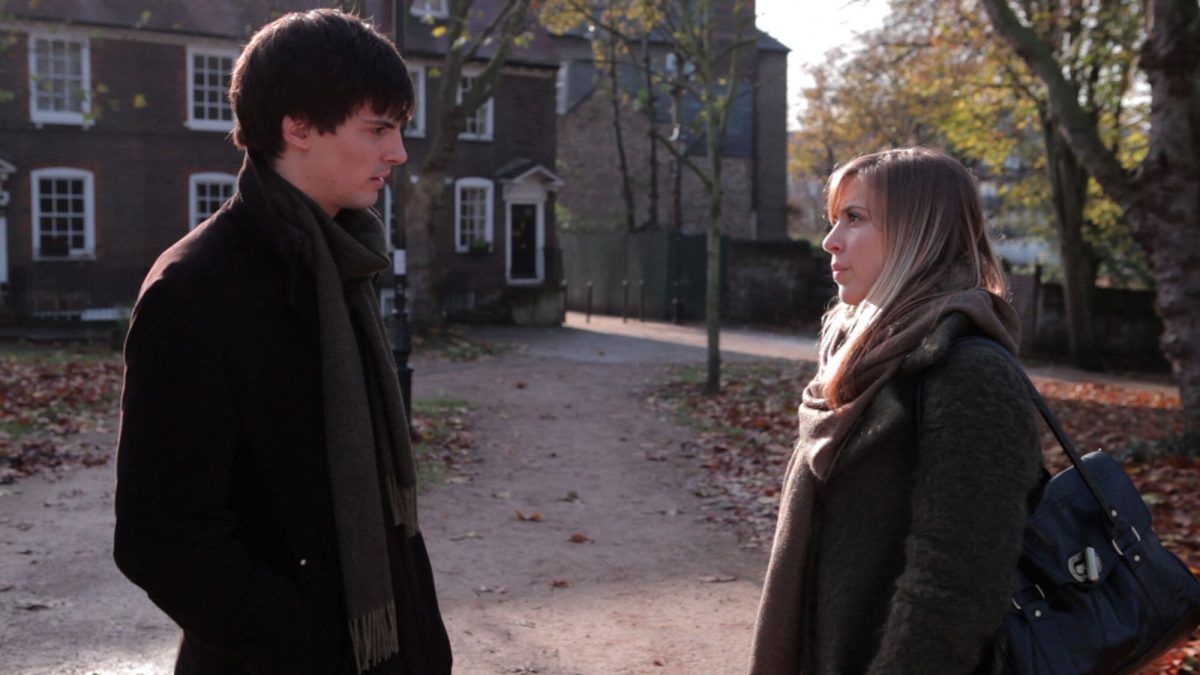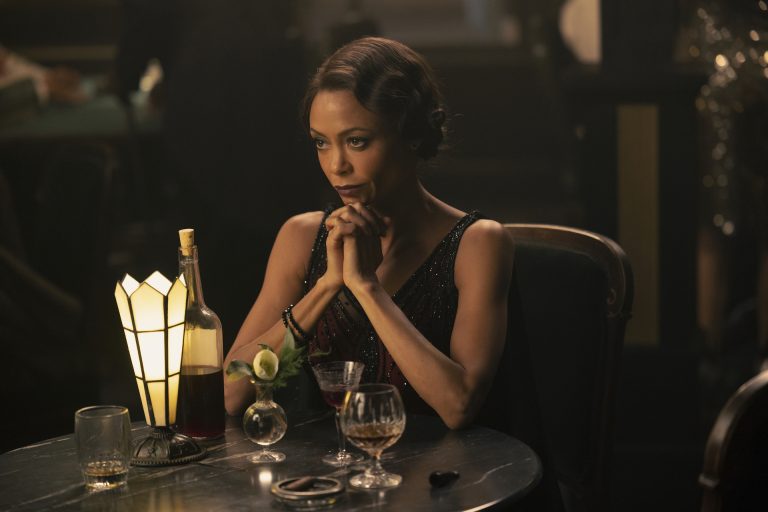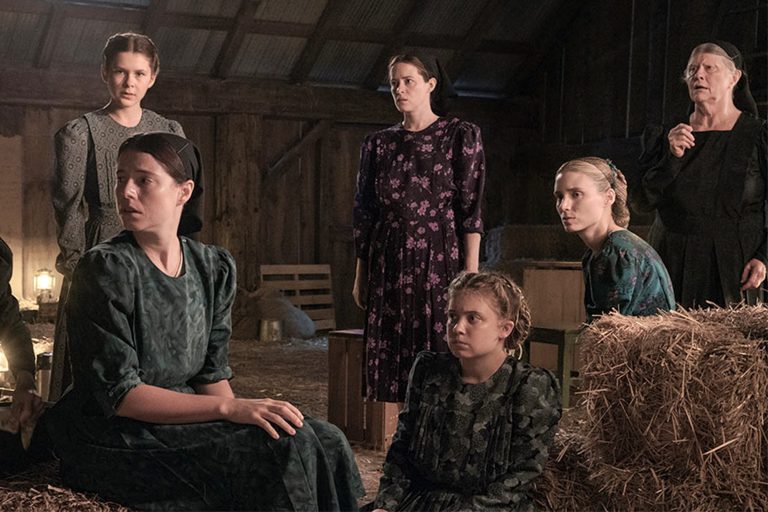In Frequencies (OXV: The Manual, 2013), Darren Paul Fisher envisions a world governed by an invisible force—each individual’s life defined by their personal ‘frequency.’ This frequency dictates fortune, luck, and emotional capacity: those born with high frequencies move effortlessly through life but remain unable to feel, while those of low frequency are weighed down by misfortune yet capable of profound emotional depth.
At the film’s core lies the unlikely bond between Zak, a ‘Low Born,’ and Marie, a ‘High Born.’ Zak is determined to cross the divide and love Marie, while she longs to experience the very emotions her frequency forbids. Their relationship becomes a prism through which the film examines fate, free will, and the fragile possibility of love in a universe ruled by mathematical determinism.
Spoilers Ahead
Frequencies (OXV: The Manual, 2013) Plot Summary & Movie Synopsis:
Zak spends his youth chasing Marie, defying social warnings that such a bond is impossible. Marie, though brilliant, is emotionally detached, but paradoxically yearns for love. Zak enlists his friend Theo to help raise his frequency. Despite countless failures with magnets and experiments, Zak never gives up. As adults, Zak returns to Marie’s orbit, armed with new methods of manipulating frequencies through sound waves and gibberish words. These experiments succeed: Marie feels something, and the two share intimacy.
Yet this breakthrough opens a dangerous door. The words are not just frequency adjusters, but tools of mind control. Their love may not be genuine, but engineered. A hidden government agency reveals that such manipulation has existed in history but diminished with time. Zak learns the frightening truth: human will, emotions, and even history itself may be orchestrated through mathematics and frequencies. With Theo’s genius and a musical solution involving Mozart, they discover fate is calculable. By the end, Zak and Marie choose to embrace their bond, regardless of whether it is dictated by destiny.
Why Does Zak Pursue Marie Despite the Odds?
Zak is born into failure, and psychologically, his pursuit of Marie represents a rebellion against determinism. Teachers and parents insist he can’t connect with her, but Zak’s persistence comes from two impulses:
- Romantic Idealism – He embodies the belief that love should transcend structures, even ones as immutable as fate. His attraction to Marie is not merely infatuation, but a symbol of his fight against a predestined hierarchy.
- Desire for Agency – Zak’s quest is less about Marie herself at first, and more about proving to himself that he can change what the world says is unchangeable.
His actions show a psychological defiance of fatalism. In Zak’s mind, if he can win Marie’s love, he can also win his freedom from the chains of destiny.
Why Does Marie Want to Love, Despite Her High Frequency?

Marie, at first glance, appears detached and clinical, shaped by her high frequency. Yet her journey reveals a paradox: she envies what low-frequency people like Zak feel. For Marie, love represents the one human experience denied to her by her perfect ‘design.’ Her decision to experiment with Zak is not just curiosity, but an act of rebellion against her own emotional limitations. She wants to prove that she is not just a product of her frequency. Psychologically, Marie’s pursuit is about identity. To her, love is proof of humanity, a validation that she is more than numbers and destiny.
Do Zak and Theo Really Change Fate?
Zak and Theo’s discovery of words that alter frequencies is the film’s turning point. At first, this looks like the triumph of free will, a method to control destiny. But the revelation that these words are tools of manipulation reframes the victory as hollow.
Theo’s later discovery that Mozart’s music balances frequencies and that equations can predict fate suggests that what seemed like freedom was another layer of design. Instead of rewriting destiny, they have uncovered its blueprint. For Theo, this is exhilarating. He embraces determinism fully, seeing beauty in the equation of life. For Zak, it is deflating; his quest for choice collapses into the realization that love itself may be fate’s design.
Was Zak and Marie’s Love Genuine or Just Fate?
This is the film’s central question. The discovery that words and frequencies can manipulate emotions casts doubt over their bond. If love can be engineered, is it real? Zak and Marie ultimately conclude that the distinction doesn’t matter. By holding hands at the end, they reject the question of ‘authenticity’ and instead accept the experience of love as meaningful in itself, even if fate scripted it.
Psychologically, this choice reflects surrender:
- For Zak, it is giving up the illusion of control but finding peace in connection.
- For Marie, it is achieving what she has constantly desired: to feel love, even if it comes preordained.
Frequencies (OXV: The Manual, 2013) Movie Ending Explained:
What Does the Final Equation Mean?
Theo’s discovery of the ‘perfect philosophical equation’ ties together fate, frequencies, and free will. It confirms that all human actions are predictable and bound by mathematical inevitability. For Theo, this is the ultimate truth, the logical end of his intellectual hunger. For Zak and Marie, however, it is background noise. The equation may define their reality, but it does not rob them of the subjective experience of love.
The ending symbolizes two perspectives:
- Determinism (Theo’s view): Life is a script, unalterable and mathematically inevitable.
- Existential Freedom (Zak and Marie’s view): Even if life is written, the choice to embrace meaning is still ours.
The final image of Zak and Marie together is not a triumph over destiny but a reconciliation with it. Fate, equations, or frequencies may cause their love, but its existence is still transformative. Thematically, “Frequencies” argues that the human experience does not need to be ‘authentic’ in a metaphysical sense to matter. Whether dictated by equations or free will, emotions felt are still real to the person feeling them. Just as music (Mozart) can harmonize frequencies, love harmonizes destiny with human desire. In the end, Zak and Marie’s union represents the balance between fate and choice, and the acceptance that meaning is not found in escaping destiny, but in living it.






